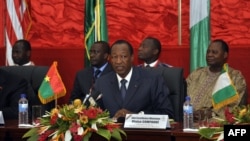An official of the Economic Community of West African states (ECOWAS) says the group’s technical team is assessing the situation in Mali to help the sub-regional bloc resolve the security crisis in that country.
Abdel Fatau Musah, ECOWAS director for external relations, said his organization is determined to ensure that Mali elects a new president by March next year as part of what he says is effort to restore constitutional order.
ome analysts have expressed concern that the current leadership in Mali -- which came to power following the ouster of former President Amadou Toumani Toure. -- is not representative of the entire country.
Musah said regional heads of state that form the contact group on Mali have called on all interested domestic parties to form a government representing all segments of society.
“The decision they took was that before 31st July, they should come up with proposals on broadening the government to make it more inclusive in order to have a legitimate authority in [the capital], Bamako,” said Musah. The new government, he said, would work with the international community on resolving an on-going constitutional crisis and a rebellion in the north.
The stakeholders’ proposal is expected to be handed over to Mali’s interim President Dioncounda Traoré, who will in turn present the document to ECOWAS appointed mediator and Burkina Faso President Blaise Compaore for consideration.
“All the stakeholders should come together under the facilitation of the transitional government and the prime minister, to draw up a timetable and a roadmap with major paths along the way and a timeline for their execution leading up to the election of a new president for the country,” said Musah.
West African leaders met Saturday in the Burkinabe capital, Ouagadougou, with representatives of political parties and other civil society groups to talk about the way forward in Mali.
Some Malians have called for more support for the national army so it can crush the rebellion in the north. Musah said an ECOWAS standby force is ready to help.
“A technical assessment mission of ECOWAS with the participation of the African Union experts and also the U.N. experts are in Mali assessing the state of the army, and drawing up plans for the eventual deployment of these troops,” said Musah.
“Their main objective is; one, to secure the transitional process in Bamako. Number two, to work with the Malian army in order to restructure it, re-instill discipline and re-equip it and re-train it for the task ahead.”
He said the Malian army will lead any effort to crush the rebellion in the north if dialogue with the rebels fails to resolve the security crisis.
“By March of next year, we expect to have a president installed. We are very determined about that and all the stakeholders in Mali want it…ECOWAS has shown its commitment since the crisis began -- that the Malian situation is not only a national issue, it’s a regional issue,” Musah said.
Abdel Fatau Musah, ECOWAS director for external relations, said his organization is determined to ensure that Mali elects a new president by March next year as part of what he says is effort to restore constitutional order.
ome analysts have expressed concern that the current leadership in Mali -- which came to power following the ouster of former President Amadou Toumani Toure. -- is not representative of the entire country.
Musah said regional heads of state that form the contact group on Mali have called on all interested domestic parties to form a government representing all segments of society.
“The decision they took was that before 31st July, they should come up with proposals on broadening the government to make it more inclusive in order to have a legitimate authority in [the capital], Bamako,” said Musah. The new government, he said, would work with the international community on resolving an on-going constitutional crisis and a rebellion in the north.
The stakeholders’ proposal is expected to be handed over to Mali’s interim President Dioncounda Traoré, who will in turn present the document to ECOWAS appointed mediator and Burkina Faso President Blaise Compaore for consideration.
“All the stakeholders should come together under the facilitation of the transitional government and the prime minister, to draw up a timetable and a roadmap with major paths along the way and a timeline for their execution leading up to the election of a new president for the country,” said Musah.
West African leaders met Saturday in the Burkinabe capital, Ouagadougou, with representatives of political parties and other civil society groups to talk about the way forward in Mali.
Some Malians have called for more support for the national army so it can crush the rebellion in the north. Musah said an ECOWAS standby force is ready to help.
“A technical assessment mission of ECOWAS with the participation of the African Union experts and also the U.N. experts are in Mali assessing the state of the army, and drawing up plans for the eventual deployment of these troops,” said Musah.
“Their main objective is; one, to secure the transitional process in Bamako. Number two, to work with the Malian army in order to restructure it, re-instill discipline and re-equip it and re-train it for the task ahead.”
He said the Malian army will lead any effort to crush the rebellion in the north if dialogue with the rebels fails to resolve the security crisis.
“By March of next year, we expect to have a president installed. We are very determined about that and all the stakeholders in Mali want it…ECOWAS has shown its commitment since the crisis began -- that the Malian situation is not only a national issue, it’s a regional issue,” Musah said.
